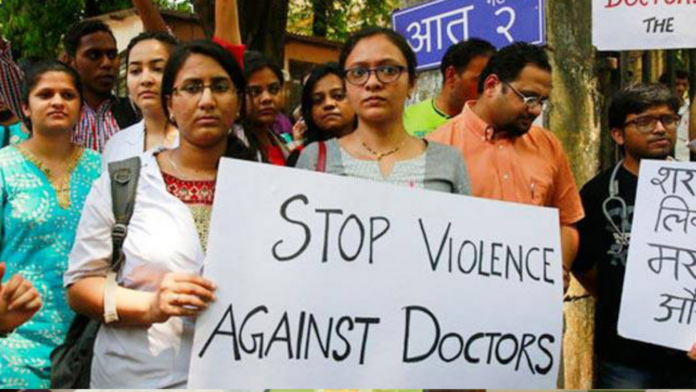By Dr Arun Mitra
Suicide by Dr Archna Sharma, a senior Gynaecologist of Dausa in Rajasthan has shaken the medical fraternity. A patient is reported to have died during a procedure after which the attendants reportedly under the patronage of a BJP leader created ruckus. The police instead of controlling the mob registered a case of murder against the doctor u/s 302 IPC. Perturbed over this, the doctor committed suicide. Police role in this case is highly condemnable and demands of registering case of abetment to suicide against the concerned police officials. A doctor is more than a healer. She/He is not just adding to the economic development but also addressing the emotional part of the patient and the family. Her/his loss cannot be counted in terms of money. With the death of a doctor thousands of patients get devoid of sympathy and empathy they were getting from a trusted person. Loss of Dr Archna Sharma has to be viewed in this context.
This is not the first time that violence has taken place against doctors. A maximum of such incidents have occurred in Maharashtra. The violent incident in Bengal two years back got so much highlighted because the political atmosphere was highly surcharged. Doctors can be booked for negligence u/s 304A only after a thorough inquiry into the incident. Registering a murder charge against a doctor without inquiry is equivalent to a criminal offence on the part of the law enforcement agency. How can one work in an atmosphere of uncertainty, particularly when it comes to treating a person which requires a lot of concentration, care and empathy?
We need to ponder over the reasons for such repeated acts of violence, the immediate measures required to prevent such acts and the long term solutions to ameliorate the situation.
When death of a near and dear occurs emotional outburst is understandable. This does not in any way mean that they should resort to violence. There are several ways to redress the grievances. Many times, the young doctors in the hospitals have to work continuously for up to 36 hours or more. This puts them under a lot of stress and strain. At the beginning of their career they are learning to develop communication skills to satisfy the patients’ attendants. Whatever the reason, society has to understand that those giving treatment are trained to heal, not to kill. As medical students they are taught to be modest and sympathetic. Barring a few black sheep negligence is not a rule but an exception. As negligence cannot be condoned, so is the violence never justifiable.
A national level law against violence on doctors can be a strong deterrent. But many perpetrators of violence are ignorant of laws. Unfortunately, it has been found that the law enforcing agencies too lack such information.
Our health care facilities in the state sector lack required infrastructure. With a meagre 1.1 per cent of the GDP spending on health in the public sector, patients have to look forward to the private sector for secondary and tertiary care which costs them an exorbitant amount. This becomes another point of discord.
It is time the doctors take interest in the public’s concerns on health issues. This will integrate them with society. Not many medical bodies reacted to deaths in Muzaffarpur, nor in Gorakhpur. The medical bodies failed in supporting Dr Kafeel who had to languish in the lock up because he raised the faults in the healthcare infrastructure at Gorakhpur.
Medicos should be in the front rows to help the needy in the event of natural calamities or other situations of public health crisis. Such gestures help to remove negative feelings about medical professionals in the society.
Culture of violence is being made a norm in our country. Calling ourselves followers of Buddha, Guru Nanak and Gandhi we have seen violence to the extreme in 1984, 2002 in which even the doctors were not spared. Now we are witnessing it in the form of vigilantes and mob lynching. Some of the lawmakers have been issuing very irresponsible statements, even rewarding those involved in mob lynching. Those at the helms of affairs should show more responsible behaviour. If violence is eulogised then it becomes a norm and part of the psyche which does not spare anyone, even the perpetrators. Violence prevention has to be a public health issue. The doctors have to stand against all sorts of violence. Unfortunately we react only when it happens to us. The communal frenzy being raised will further deteriorate the situation. Medical professionals have to be in the forefront to lead movements for social harmony. History is witness to how a section of doctors helped Nazis in eliminating the opponents.
Pledges by the doctors to raise collective voice against any kind of violence and efforts to change the culture of violence being promoted by the vested interests will be the real tribute to Dr Archna Sharma. (IPA Service)


